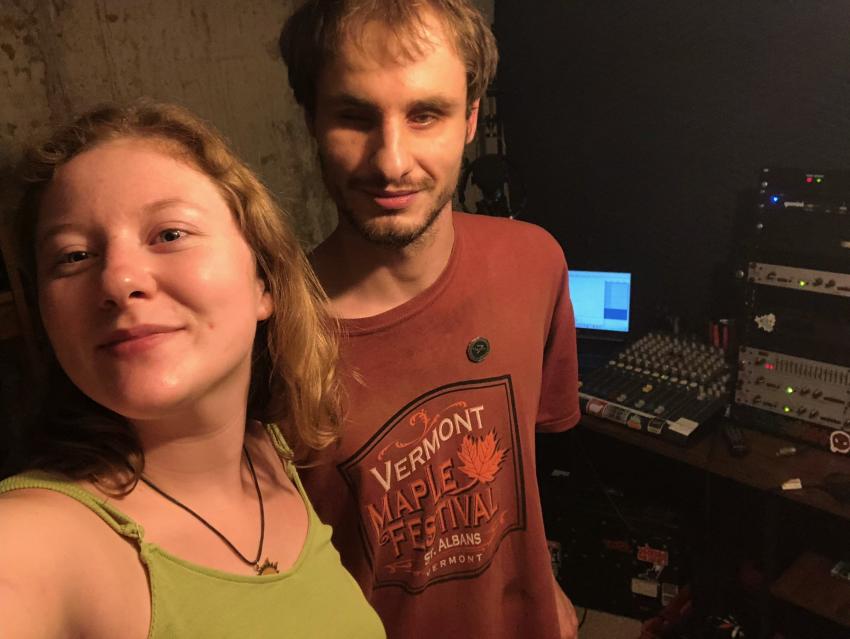Planning for college or training next year? Apply for the Vermont Grant and explore VSAC’s free scholarship booklet to help you cover costs.
Despite challenges, Vermont State University student Alek Wolfe keeps his ears on the prize

In 2018, Bellows Free Academy-St. Albans student Alek Wolfe was sitting next to award-winning sports announcer George Commo in the press box of the Collins-Perley Arena in St. Albans. Alek was there to provide commentary for a women’s high-school hockey game against Rutland. “I was in the middle of putting in a stat, and then I heard the crowd ramp up. St. Albans scored, and I called the goal. It was exhilarating,” Alek recalls.
It would be exhilarating for any aspiring broadcaster, but especially so for Alek, who is legally blind. He was diagnosed as an infant with retinopathy of prematurity, a condition that affects some babies who are born before the blood vessels of the retina have fully developed. In Russia, where Alek was born and lived in an orphanage until age 6, medical treatment wasn’t offered early enough, and today, at age 24, he can only see light or dark.
“When I’m walking outside, I can tell where the sun is, so I use that as a compass,” Alek explains. And when he’s broadcasting a hockey game, he does it all by sound – and by putting in a lot of prep time before the puck drops.
“As far as broadcasting, I have to do a lot more work,” he says. He mostly does color commentary, where he peppers a colleague’s play-by-play with facts and statistics. “So I do a lot of research, and I talk to coaches and players before the game. During the game, I know which sides the teams are on. So if the puck is on the right side of the rink, our team has it. If the puck is on the left, it’s the other team. And I feed off the crowd. If I catch something, I’ll call it,” he says, adding that he’s called several plays in real time since that seminal BFA Comets hockey game.
Tuning in to a drive to be on radio
Alek moved to Vermont from Pennsylvania with his adoptive family in 2009, when he was in the third grade, and he completed middle and high school in St. Albans. He says his interest in broadcasting really started to take off when he was at BFA, when he started building a portfolio.
“I had a small, handheld digital recorder, and I brought that recorder everywhere with me. Hockey games, concerts, you name it,” Alek recalls. He started announcing local basketball games in 2014. In the summer of 2016, after meeting Commo and giving him some work samples, he was invited to join him in the announcing booth for a Vermont Lake Monsters game. “The night of the game, I thought I was only going on for an inning or two. I get up there, and then George says, ‘I hope you’ve done your homework, because you’ll be here for the whole broadcast.’”
Alek says that night was a turning point, both for him and for his mom, who had been skeptical of his interest. “I think that night, she started to understand that I was really serious, and that I wasn’t joking about this whole radio thing,” he recalls.
But even as he prepares to graduate from Vermont State University – Lyndon in May with an associate’s degree in broadcasting, Alek says his mom is still a bit wary, understandably concerned about how her son will fare in a career designed for sighted people.
“With my being blind, I think she’s just nervous about failure,” he says. But, says Alek, “the reality of life is that we all have to fail in order to succeed. I just have this drive to be in radio.”
When it came to pursuing his dream career, Alek sought out opportunities for job shadows and asked advice from professionals in the business.
When it came to navigating a sighted world, both as a student and as an audio producer, technology became his savior.
In high school, Alek lugged a heavy braille machine and had to rely on a paraeducator to transcribe his assignments. Now, he uses a laptop with a Braille display and a screen reader – which works for school assignments, but not so much for broadcasting. “When you’re on the radio, no one wants to hear ‘up arrow, down arrow,’” Alek says with a laugh. So he found a phone app called Be My Eyes to read his sound board. Every day, Alek says, he’s figuring out new ways to work better and faster.
And when it came to college, Alek says, “VSAC has helped me tremendously. That’s an understatement.”
Alek’s older siblings didn’t go to college, and his parents’ experience with higher education was technical school, where his mom received her training for her career in nursing.
So when Alek had questions, he reached out to Marti Kingsley, who was his VSAC Outreach counselor.
“I first connected with Marti to talk about loans,” Alek recalls. “She spent an hour or two with me just talking through all of my options.” This year, he turned to Marti again when something on his bill didn’t seem right. “I asked Marti if she could look into it, and the following day, we had it all straightened out. When I go to her, I know something good’s going to come out of it.”
Alek’s drive, talent, ingenuity and hard work have already brought him a lot of success. He started his own internet radio station, called The Wolfe Den Network, in 2020, and he runs a popular alternative-music podcast, called “Bants and Bands,” with fellow Vermont State University student Emily Beckett. While Alek and Emily didn’t know each other well at the start, their collaboration kicked off with an easy rapport and turned into a solid friendship. “Our topics are bullet points, and none of it is scripted. We have over 60 episodes at this point,” says Alek, who says he’s actually heard his own voice around campus from the phones of passers-by. “The podcast has taken off in ways I never could have imagined.”
As for next steps, Alek plans to keep building The Wolfe Den Network. “I hope to make a business out of it, and to offer another radio station here in Vermont. We don’t have enough local stations,” he says.
Pursuing his dream with a realistic view
While Alek is determined in pursuit of his dream, he is also a realist in an evolving media economy that hasn’t been kind to radio. So, over the last few years, he’s diversified his offerings and his options.
“I’ve always loved music, so during the pandemic, I started collecting DJ’ing equipment, and I’ve also started producing for some local artists on music streaming platforms,” he says. “The truth is that radio doesn’t pay a lot, so I know I’ll need some other things to keep me going.”
Those other gigs have started taking off alongside his broadcasting career. Last year, Alek DJ’d an event for 150 people at the Middlebury Theater, and he’s currently making vinyls and selling online merch for a local musician.
“It’ll be really cool to hold one of those vinyls in my hand and say, ‘I did this,’” Alek says. “I’m excited to see where I’m going.”





